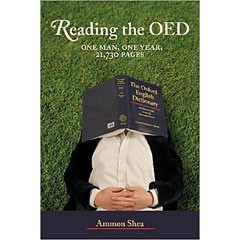
"For a brief period of time I find myself wondering if what I am doing is so abstruse that even the lexicographers think I am a nerd." If this is a thought you've had, then you're probably right. You are a nerd. In attempting to read the entire Oxford English Dictionary in one year while chronicling his discoveries and insights in a Supersize Me documentary manner, Ammon Shea sets himself squarely in the "nerdy" category.
That said, the Oxford English Dictionary is no easy undertaking, the current edition running 22 volumes at 21,730 pages. Even reading at the rate of 8 to 10 hours a day, it takes Shea an entire year to digest every word, but his point in exploring the plethora of options available to us is made clear: Very few of us who claim to speak English know anything about the words we do, or do not, use.
What's truly humorous, besides perhaps his blissful ignorance to the fact that no one is interested in his daily trials and tribulations of etymological exploration, are his own little notes and addendums to the selectively scribed vocabulary that makes up most his book. From A-Z, the reader is presented with words equally useful such as impluvious ("wet with rain") and hilariously useless, such as lant ("to add urine to ale, in order to make it stronger"). Some words lacking immediate use may be worth retaining for just the right occasion, such as gymnologize, "to dispute naked, like an Indian philosopher."
Presented as he is with so many similar words, Shea finds himself constantly plagued by onomatomania (vexation at having difficulty in finding the right word). "Of course, as soon as I learned this word I promptly forgot what it was, but this just provided me with the frustration of not being able to think of it, and then the satisfaction of once again finding it," he says.
In an age when English has fallen from grace and radical grammarians such as Lynn Truss suggest actually defacing public property with large markers to correct grammatically-incorrect advertising, Shea's goal appears both tame and reasonable. Recognizing the outrageous number of perfectly serviceable words we've simply chosen to exclude from our vocabularies for a lack of knowledge that they exist, many of us are, as Shea describes it, more akin to tourists with language guidebooks of common words and phrases than articulate English speakers, and so are lacking in a historically rich and verbose vocabulary that could make our lives much clearer.
Now, will you be able to use the word advesperate (to approach evening) without being called a blouse-wearing pussy? Probably not, but you will know that there's a word for it while gloaming in your own self-congratulatory erudition. And no one can call you a pussy for that.
Comments